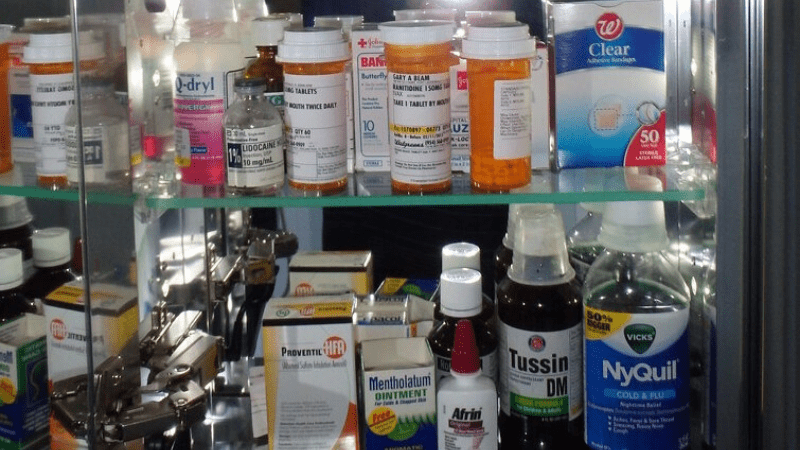But you’re prepared. You’ve got the medicine cabinet stocked with all the essentials and then some: Tylenol, Advil, Vick’s, Sudafed, Benadryl, Robitussin, DayQuil, NyQuil… the list goes on! We’re here to remind you that any and all of these medications could be dangerous to the furry family members in your house. Keep reading for information on how common winter medications can affect your pet and what to do if your pets get into something they shouldn’t.
❄️Allow 7-10 minutes to read the full post ❄️
That being said, accidents happen. Your distracted 15-year-old forgets to put the NyQuil back where it belongs. Or you’re in a hurry and you knock the bottle of Ibuprofen off the bathroom shelf without realizing it. Below is a list of some typical household medications and how they could be dangerous to your pet.
NSAIDs (aspirin, ibuprofen, Motrin, Advil, Aleve, etc.)
Dogs and cats should never be given a human NSAID (non-steroidal anti-inflammatory drug). These painkillers are toxic to pets and can cause immediate and sudden onset of symptoms. The first signs of toxicity include vomiting, bloody stools, diarrhea, nausea, loss of appetite, pale gums and loss of bladder control. A dog who gets into one or two tablets may only show these initial symptoms; however, cats are much more susceptible to NSAID toxicity and even a small amount of medication could be lethal. The more of an NSAID that a pet consumes, the more dramatic the symptoms. As time goes on, the medication will pass into the pet’s bloodstream and affect the central nervous and digestive systems. This causes more severe symptoms such as disorientation, abdominal pain and stomach injury (eg. stomach ulcers), and kidney damage.
Benadryl
Benadryl is actually safe for pets as long as it is given in correct doses. However, side effects can occur, and Benadryl is not safe to give if a pet has certain health conditions. Side effects may include drowsiness, hyperactivity, or difficulty breathing. Pets with glaucoma, high blood pressure, or cardiovascular disease should not be given Benadryl. Overdosing is also possible and could lead to seizures, coma, or death. Never give your pet Benadryl without first consulting with your veterinarian.
Acetominophen — (Tylenol, DayQuil, NyQuil)
Cats are extremely susceptible to acetominophen poisoning because of their metabolism, and even one Tylenol tablet could be fatal. Signs that a cat has consumed acetaminophen include lethargy, loss of appetite, swelling of the face or paws, difficulty breathing, faster breathing, open mouth breathing, vomiting, and abnormal gum coloration.
Pseudoephedrine (Sudafed, Allegra-D)
Pseudoephedrine is an active ingredient in Sudafed and other cold/allergy/sinus medications. This ingredient is not safe for cats or dogs. Pseudoephedrine stimulates a pet’s nervous and cardiovascular symptoms, causing increased heart rate, panting, high blood pressure, nervousness/restlessness, agitation, tremors and hyperactivity. Pseudoephedrine is fast-acting, and a pet will need treatment quickly if Sudafed or other pseudoephedrine-containing products are ingested. Pets that consume a liquid formulation or immediate release tablets/capsules tend to show signs quicker (as soon as 15 minutes after consumption).
Pet Poison Hotline: (888) 426-4435
Put this phone number on your fridge, in your contacts, and anywhere else where you can refer to it quickly. If your pet is experiencing a health emergency, you don’t want to be scrolling through Facebook posts to try to find the right phone number!
🎁Tune in tomorrow for information about what will happen if your pet gets into the eggnog!






